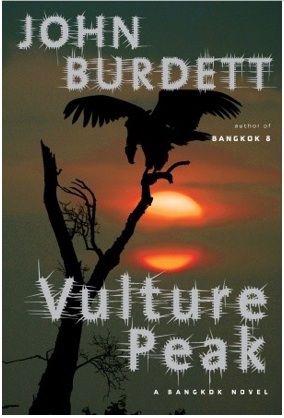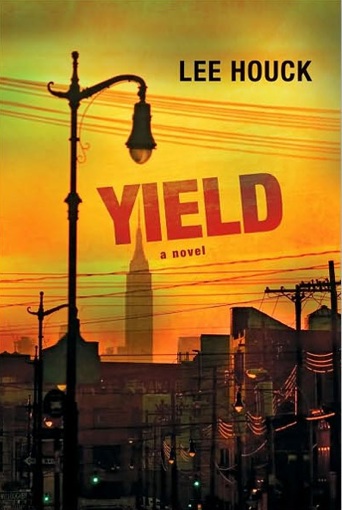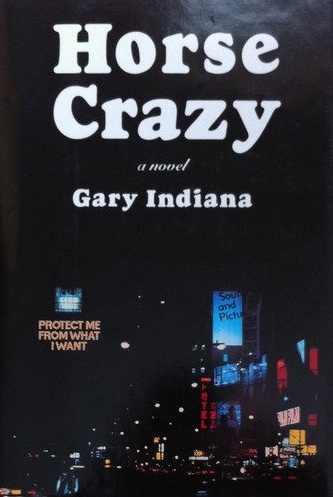Gary Indiana, Lizzie Borden, John Burdett, and Lee Houck -- none of these artists was on my mind when I embarked on raising funds to produce a play, Konrad Product's Natural-Born Hooker. Nor did I have any idea that a Kickstarter campaign would becomes its own education, a course encompassing everything from marketing to video making. But despite the anxiety that a Kickstarter campaign entails (it's an all-or-nothing proposition: we only are funded if we meet our target $25,000 by April 24, 2012), I soon realized I could use the process as a sort of independent studies course in sex work, much like how my foray into the world of underground safehouses unexpectedly led to writing my first novel, hidden. I've been able to use a fundraising campaign to talk with people -- about everything from HIV education to the idea of "natural-born hooker" as character and cultural and economic player.
This educational opportunity was first hinted at during early discussions with the Natural-Born Hooker's director (and co-producer), Ramon Del Barrio, when he explained his interest and said, "What appealed to me about Natural-Born Hooker is the journey it takes through debauchery that's human and sexy. The eponymous character offers a way of experiencing that and learning about a life that I would never have explored had I not read the piece."
Although it remains to be seen if writing about Natural-Born Hooker has actually helped our Kickstarter, it has served to remind me what I loved about the lure of reporting, namely the self-credentialing and the license to talk to anyone about anything. Being both writer and editor, for this "assignment" I chose the four aforementioned artists and asked them to talk about why (or why not) a "natural-born hooker" was the central character in their films and novels.
* * * * *

In Southeast Asia the world is understood to be a vast, complex network of interdependent relationships. So when global capitalism makes it impossible for small-time rice farmers to feed their families and make a living, it is a natural thing for anyone in the family who can find an alternative source of income to do so. In Thailand many thousands of young women flock to the big cities, especially Bangkok, to sell their bodies. By and large they do it because Thai culture stipulates that the young and vigorous must look after their parents and grandparents, and elder siblings must look after younger ones. In the village she is usually hailed as a saint, a young woman who perfectly interpreted the Buddhist exhortation to do her duty to her mother and father.
I met Om early on in my time in Bangkok. I was walking down a street with her one day, and we happened to pass a building site where young women were hauling bricks and cement, their faces covered against the dust and sun. Om nodded at the site and said, "I also worked on a building site like that. I worked 12 hours a day, six days a week, for a dollar a day. I could not afford to help my family or even feed myself. Now I freelance in a bar. I have plenty of money, and I am able to send some back so my father can buy the medication he needs for his heart condition. I can buy all the food I need, and pay my own rent. Tell me, Khun John, what would you do in my place?
* * * * *

I met Lizzie Borden after a screening of Blank City, Celine Danhier's documentary (featuring Steve Buscemi, Susan Seidelman, and Jim Jarmusch) about the '70s New York film scene, which set the stage for what is now regarded as the golden age of independent American film -- and Borden's follow-up, Working Girls. Borden's second film is a nuanced character study about women who toil in a Midtown brothel and was released by the original Miramax, achieving both critical (Sundance Special Jury Prize for Best Director) and commercial success ($2-million box office gross). Currently living in Los Angeles, Borden is working on several film and television projects. Brilliant in the way of Hillary Clinton or Michelle Obama, Borden spoke about Working Girls' relationship with the notion of a natural-born hooker:
My film Working Girls wasn't about "natural-born hookers" but about hookers who were not "naturally" born... for whom it didn't come naturally. These women "adapted" to it for economic reasons, although I also included portrayals of more "natural-born" hookers -- women whose body types predestined them to hooking, especially women with large breasts which drew so much attention that they came to believe from an early age that this was their only value. They were hookers who were hookers in spite of themselves.
When you say "hooker," people assume one is referring to street hookers or high-priced call girls. What I associate with street hookers is pimps, for whom being "turned out" is a way for a women to prove her love for a wannabe "daddy." I think sometimes with young gay men, hooking is as a way to validate their attractiveness, and they take a kind of pleasure and enjoyment in being wanted. That may exist in middle-class settings when a girl is chosen more than others and gets an ego boost, but in this brothel, in Working Girls, there isn't that strutting that exits in other settings.
The women in Working Girls are "middle-class" women who relate to men in a kind of "girlfriend experience." For the lead character, it becomes a tradeoff. She and the other characters would rather rent out their bodies for a few hours a week than spend 40 hours a week at a mindless job, even though hooking was often repugnant -- and unnatural -- to them. I mean, hooking is hooking. It's really about the nature of work, the economics of work.
In Working Girls, condoms were used all the time. It was the '80s, and they were viewed as a necessity. Part of the working girl's whole trick was what you do with condom -- how to get it on -- and then what to do with a used condom. The details of the work always interested me. Waitresses, for example -- I love seeing exactly how it's done. How do they get the ketchup into the bottle?
* * * * *
 Lee Houck's quiet yet intense first novel, Yield, follows the oddly mesmerizing Simon, a medical records worker by day (and sometimes night) and occasional male escort by night (and sometimes day), wildly different forms of work that express fundamental material and psychic uncertainties. Yield's beautiful central character's intractable nature frustrates those drawn into his orbit. Depicting a variegated lifestyle that approximates an uncertain existence, Houck's deceptively casual prose glosses Simon with an ambivalence that both stands outside time while being very much grounded in a sensibility of this time, namely being fully noncommittal about how he apprehends reality. Over Facebook, Houck shared his thoughts about Yield and dealing with the inevitable queries about whether or not the novel was a thinly veiled roman a clef:
Lee Houck's quiet yet intense first novel, Yield, follows the oddly mesmerizing Simon, a medical records worker by day (and sometimes night) and occasional male escort by night (and sometimes day), wildly different forms of work that express fundamental material and psychic uncertainties. Yield's beautiful central character's intractable nature frustrates those drawn into his orbit. Depicting a variegated lifestyle that approximates an uncertain existence, Houck's deceptively casual prose glosses Simon with an ambivalence that both stands outside time while being very much grounded in a sensibility of this time, namely being fully noncommittal about how he apprehends reality. Over Facebook, Houck shared his thoughts about Yield and dealing with the inevitable queries about whether or not the novel was a thinly veiled roman a clef:
I think people are even truer versions of themselves during anonymous or near-anonymous sexual encounters. I wanted to write about that fringe of space, or the liminal period, when we let ourselves be intimate and vulnerable in ways we might never with our partners or boyfriends. I knew I was writing a novel about becoming the most real version of yourself, the most distilled -- not "best" but truest -- version, and Simon, a sex worker, had probably been at the edges of that distilled place more often than a person who has little reason to confront himself this way. And with that, the novel took off.
People want to connect the dots that way, to presume that the creator was once a sex worker, but that has more to do with the difficulty believing that writers really do create something fully realized from nothing. My personal history with sex work is inconsequential. Does anyone worry that Anne Rice is a vampire?
* * * * *
 A dazzling multi-hypenate and New York City raconteur, Gary Indiana's career has covered the waterfront: a celebrated novelist, art critic, and journalist, he has also written screenplays and acted in movies. Currently, Gary Indiana divides his time between New York City and Havana, Cuba, where he's working with a theater group of deaf mutes and on a novel about an 18th-century courtesan, Madame George Margartie Justine Weimer. The former Village Village art critic and current Book Forum contributor has written three books in which a male sex worker is a central or significant supporting character: Rent Boy, Three Day Fever, and Horse Crazy. When we spoke, I asked him to share why he had been repeatedly drawn back to natural-born hookers:
A dazzling multi-hypenate and New York City raconteur, Gary Indiana's career has covered the waterfront: a celebrated novelist, art critic, and journalist, he has also written screenplays and acted in movies. Currently, Gary Indiana divides his time between New York City and Havana, Cuba, where he's working with a theater group of deaf mutes and on a novel about an 18th-century courtesan, Madame George Margartie Justine Weimer. The former Village Village art critic and current Book Forum contributor has written three books in which a male sex worker is a central or significant supporting character: Rent Boy, Three Day Fever, and Horse Crazy. When we spoke, I asked him to share why he had been repeatedly drawn back to natural-born hookers:
The original title of Rent Boy was "Hatred of Capitalism" -- the publisher talked me out of using it. I'm a little dubious about the phrase "sex worker." I've never been able to get my mind around that term, because [laughs] I always thought the point of male prostitution is that it isn't much work.
I think men look up to men who are prostitutes. Nobody forces men into prostitution the way they do women. It just doesn't happen to men. They decide, "I'm good-looking, I have a big dick, and I can get it hard for anybody. Why not sell it?"
For women, it's a whole different story. Often, it's one of the few options that women have to stay alive, whereas most men don't really need to do it. It's not that they're going to starve if they don't do it. Also, men don't become declassed by becoming prostitutes in the way women are. For a man, there are no such consequences.
In Rent Boy, it's a metaphor for economics. I'm fascinated by the whole thing. Almost everything in this economy is prostitution. So I think a prostitute's a good character. And these days, even though everyone is having a hard time, nobody's rate has gone down.